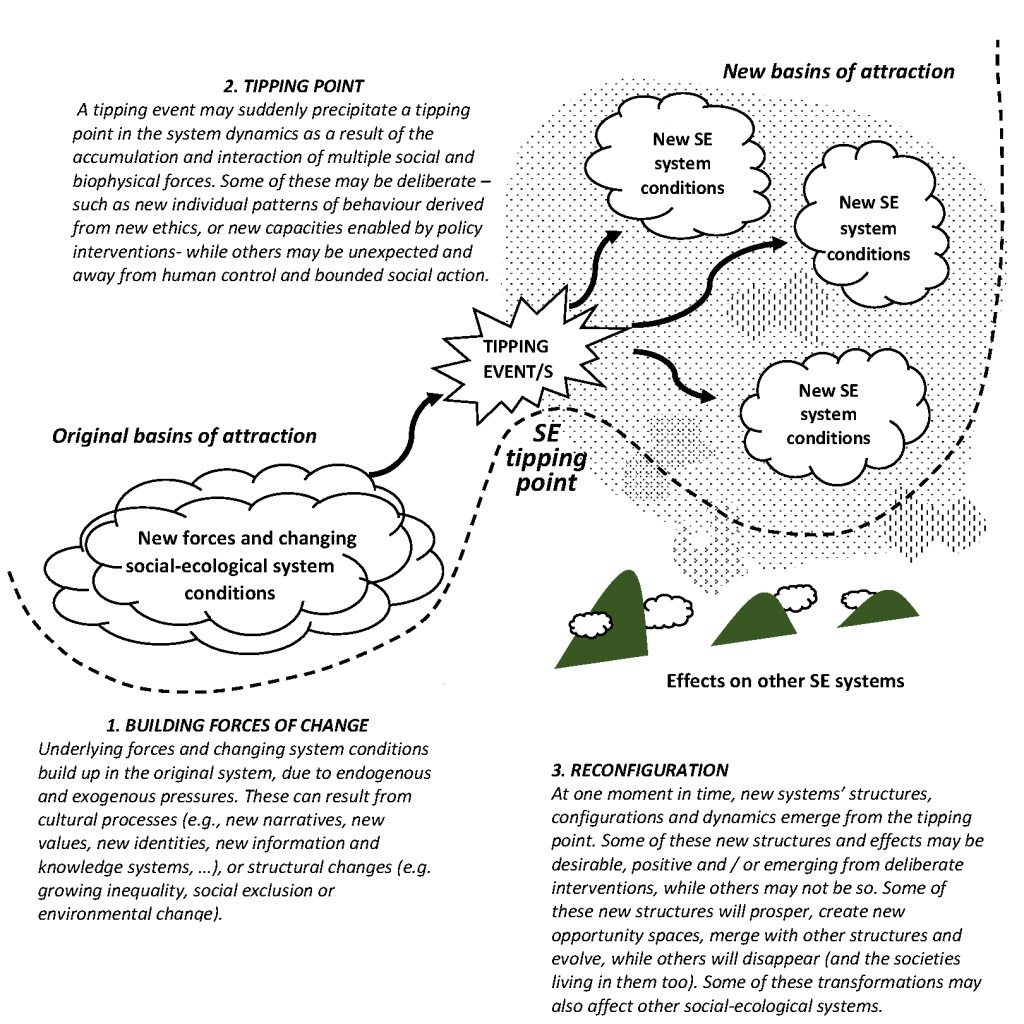
This article is part of the ISC’s Transform21 series, which features resources from our network of scientists and change-makers to help inform the urgent transformations needed to achieve climate and biodiversity goals.
The COVID-19 restrictions have altered only slightly the increasing trajectory of global GHG emissions, and this kind of relative reduction does not guarantee that the Paris Agreement target of keeping global warming below 1.5°C by the end of the century will be met. Deep and fast transformations are needed in the way many socio-ecological systems currently operate, not only to avoid major global catastrophes, but also to realize the many positive visions for a safe and just future for humankind emerging from communities and networks around the world.
Against this backdrop, there is an urgent need to understand how positive tipping points occur and can be enabled in practice. Positive tipping points exist in many kinds of systems, including health, information, energy, technological, governance, economic and financial systems, as well as educational and cultural ones. They can occur at the very individual and personal level, as well as within organizations and at the level of large interconnected systems. Historically, positive tipping points have happened in certain societies following a combination of socio-political and cultural trends and deliberate actions, such as when slavery was abolished, when women got the right to vote and to have an equal education, or when forced child labour ended. In the social universe, tipping points always emerge within a given social context or system of reference. They are usually triggered by an alternative vision of the future, followed by the building of transformative conditions and an eventual unfolding event, although we cannot predict when or even whether they will happen.
Despite the difficulties of empirically studying of tipping points, we can now creatively and systematically research the possibilities for fostering the emergence of positive tipping points in many domains of action, such as to accelerate global decarbonisation. These include positive tipping in financial systems resulting, for instance, from large public and private funds fully divesting from carbon assets to a point when it becomes more economically profitable to invest in non-carbon and restorative economy funds. Positive tipping of socio-energy systems could also occur if perverse subsidies in non-renewable energies were ended altogether, so that renewables were able to displace non-renewables and become profitable without the need for public support, and if the further development and implementation of renewables became self-reinforcing via socio-technological learning. However, these positive tipping processes also require other deep and synergetic changes in many other cultural, governance, institutional and knowledge systems if they are to successfully address the complexity and magnitude of interconnected global environmental challenges. A common feature of these tipping processes is that they lead to reinforcing feedbacks and virtuous cycles of subsequent transformative change, which then become autonomous forces of positive change.
Based on our ongoing research within the TIPPING+ project we can define positive tipping points, and particularly, with regard to policy action, as those moments in which due to previous cumulative and targeted interventions, a relatively small additional action or event is able to generate structural deliberate change on a given system to another different qualitative configuration.
A tipping point can therefore redirect a certain system either towards a sustainable trajectory – that is, a ‘sectoral tipping point’ – or more broadly, towards a sustainable new system’s ‘basin of attraction’ – a ‘full-systems’ tipping point. This conceptual distinction allows us to differentiate between those limited changes or technological transitions that may occur within certain sectors, such as replacing fossil-fuel powered mobility with electrical mobility but without much impact on other institutional systems; and those transformations that also entail profound mental, ethical and institutional changes in multiple social-ecological systems. Interactions – both synergies and trade-offs — between sectoral and systemic tipping points are manifold. However, they are still largely unexplored by empirical research and often confused with the related notion of leverage points. The general lack of field and systematic comparative work is notably the case when it comes to study how positive tipping points could be enacted in regions where livelihoods are strongly linked to the intensive use of coal and carbon.
If we want to learn how to deliberately enact positive tipping points in specific contexts, it may be useful to think of them as encompassing three critical moments or stages. Firstly, the building of the transformative conditions and capacities for systemic change that eventually may induce the emergence of a desirable future. Secondly, the moment in which, provided a critical window of opportunity for transformation, a sensitive intervention or tipping event may provoke the tipping of the system. Third, the passage of the system towards a new trajectory (sectoral tipping) or towards new basins of attraction (systemic tipping) also provoking different kinds of effects on other systems. A simplified caricature of how atmospheric dynamics work may be useful to represent how these complex processes occur in the social world as well:
Dynamics of Social Ecological Tipping Points (SETPs). In a systemic tipping and in a given moment in time, tipping events accelerate underlying forces of change in an original social-ecological system, leading to the reconfiguration and the emergence of new systems’ forms and dynamics within new basins of attraction. Note that systems’ structures and shapes are always dynamic and their characterisation depends also on the observer.

In contrast to a belief in top-down approaches to global problems, the empirical study of tipping points adopts a multiple and complex systems approach (especially given that global systems are not organized in vertical ways). Understanding the possibilities of positive tipping toward global sustainability requires, among other things, looking at how diverse and distributed regenerative strategies are being deployed in many kinds of systems and places, and how they do so in a creative, engaging and situated mode; examining how these strategies can contribute to reducing poverty and enhancing equity, justice and inclusiveness; and exploring how they can address multiple systems of complex interrelated problems at various time and spatial scales, while being adaptive and based on local visions, conditions, capacities and values. All in all, we need to sharpen our knowledge about what feasible transformative strategies can replace unsustainable forms of economic wealth creation processes by green, net-positive, restorative ones while generating short-term, tangible benefits too (e.g. ‘win-win solutions and narratives’).
In short, a global positive tipping point towards net positive, regenerative sustainability may only be achieved when the current human resources and capacities now largely being directed to exploit, destroy and erode the basic social-ecological conditions of sustainability are redirected, in an irreversible way, towards a completely different destination: one that propels thousands of self-reinforcing learning cycles towards the restoration of life-support systems. This also means opening up all the creative and transformative capacities that collective ingenuity can unfold whenever human rights, basic needs and positive visions for a common good can be fulfilled. That is to say a vast process of positive tipping towards systemic transformation that calls for nothing but accelerating sustainability learning at a global scale; a process in which transdisciplinary research, policy practice and civic engagement have a key and urgent role to play.
J. David Tàbara is an active member of the Global Climate Forum (GCF) and Associate Senior Researcher at the Institute of Environmental Science and Technology of the Autonomous University of Barcelona. He has 25 years’ experience of EU international research on Sustainable Development and Integrated Assessment of climate strategies. He has published extensively on socio-environmental knowledge integration methods (over 100 publications), with particular attention to questions of public perception, social learning, communication and public participation for sustainability. His recent research focuses on the assessment of win-win and transformative solutions to support sustainable climate action (GREEN-WIN project), the development of a novel science-policy approach called Transformative Climate Science (TSC) and the emergence of Positive Tipping Points in conditions of high-end climate change (IMPRESSIONS project and in intensive coal and carbon regions at the TIPPING+ project, where he acts as Coordinator at the GCF.
Image: Kande Bonfim on Unsplash